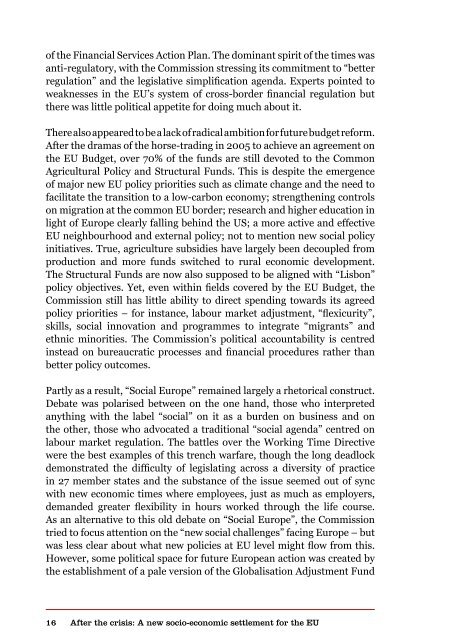Authors Iain Begg | Gabriel Glöckler | Anke Hassel ... - The Europaeum
Authors Iain Begg | Gabriel Glöckler | Anke Hassel ... - The Europaeum
Authors Iain Begg | Gabriel Glöckler | Anke Hassel ... - The Europaeum
You also want an ePaper? Increase the reach of your titles
YUMPU automatically turns print PDFs into web optimized ePapers that Google loves.
of the Financial Services Action Plan. <strong>The</strong> dominant spirit of the times was<br />
anti-regulatory, with the Commission stressing its commitment to “better<br />
regulation” and the legislative simplification agenda. Experts pointed to<br />
weaknesses in the EU’s system of cross-border financial regulation but<br />
there was little political appetite for doing much about it.<br />
<strong>The</strong>re also appeared to be a lack of radical ambition for future budget reform.<br />
After the dramas of the horse-trading in 2005 to achieve an agreement on<br />
the EU Budget, over 70% of the funds are still devoted to the Common<br />
Agricultural Policy and Structural Funds. This is despite the emergence<br />
of major new EU policy priorities such as climate change and the need to<br />
facilitate the transition to a low-carbon economy; strengthening controls<br />
on migration at the common EU border; research and higher education in<br />
light of Europe clearly falling behind the US; a more active and effective<br />
EU neighbourhood and external policy; not to mention new social policy<br />
initiatives. True, agriculture subsidies have largely been decoupled from<br />
production and more funds switched to rural economic development.<br />
<strong>The</strong> Structural Funds are now also supposed to be aligned with “Lisbon”<br />
policy objectives. Yet, even within fields covered by the EU Budget, the<br />
Commission still has little ability to direct spending towards its agreed<br />
policy priorities – for instance, labour market adjustment, “flexicurity”,<br />
skills, social innovation and programmes to integrate “migrants” and<br />
ethnic minorities. <strong>The</strong> Commission’s political accountability is centred<br />
instead on bureaucratic processes and financial procedures rather than<br />
better policy outcomes.<br />
Partly as a result, “Social Europe” remained largely a rhetorical construct.<br />
Debate was polarised between on the one hand, those who interpreted<br />
anything with the label “social” on it as a burden on business and on<br />
the other, those who advocated a traditional “social agenda” centred on<br />
labour market regulation. <strong>The</strong> battles over the Working Time Directive<br />
were the best examples of this trench warfare, though the long deadlock<br />
demonstrated the difficulty of legislating across a diversity of practice<br />
in 27 member states and the substance of the issue seemed out of sync<br />
with new economic times where employees, just as much as employers,<br />
demanded greater flexibility in hours worked through the life course.<br />
As an alternative to this old debate on “Social Europe”, the Commission<br />
tried to focus attention on the “new social challenges” facing Europe – but<br />
was less clear about what new policies at EU level might flow from this.<br />
However, some political space for future European action was created by<br />
the establishment of a pale version of the Globalisation Adjustment Fund<br />
16<br />
After the crisis: A new socio-economic settlement for the EU

















